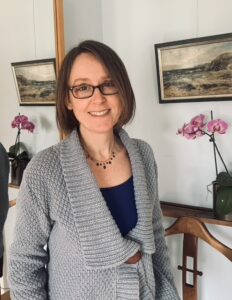Professor of English Sarah Bilston Receives National Endowment for the Humanities Fellowship
Trinity College Professor of English Sarah Bilston’s upcoming book, The Hunt for the Lost Orchid, delves into the dangerous and deceitful world of orchid hunting in the 19th century.
To support her as she uncovers the history and mysteries behind the international obsession with the elusive “lost orchid,” Bilston has received a National Endowment for the Humanities (NEH) fellowship. The six-month grant follows an NEH summer stipend that supported her work on this project last year.
“I’m incredibly honored to be recognized in this way,” Bilston said. “This gives me the space, the resources, and the opportunity to finish a book I’m really passionate about.”

Bilston’s book will follow the fierce 19th-century hunt for the “lost orchid”—Cattleya labiata—as a means of investigating the rise of consumerism and collection culture in the period, the shifting meanings of the orchid in Victorian visual and literary texts, the intersection of Big Science and Big Business, and the power of colonial profit-making.
The book narrates the 1818 arrival in Britain of a particularly glorious purple-and-crimson orchid and the rise, in the aftermath, of a cultural obsession with orchids in Europe and North America.
“‘Orchidomania,’ or ‘Orchidelirium,’ was the 19th-century equivalent of ‘Tulip Fever,’” said Bilston, whose research and teaching focus on literature of the British Victorian period.
Bilston first encountered this particular subject while doing research on Victorian gardens for her previous book about English suburbs in the 19th century. “I stumbled across repeated references to orchids and orchid hunting and thought there was a story to be uncovered here about why the Victorians loved orchids, why they wanted to find more of them, and who wanted to buy them,” she said. “I became a bit like a detective.”
The professor began work on this project in 2020, when the COVID-19 pandemic prevented her from traveling for research. “By great good fortune, many of the sources I needed to access—including the Royal Botanic Gardens at Kew—now have digitized materials, so I was able to access quite a bit online,” Bilston said. “Librarians were eager to help remotely. One librarian at the Linnean Society of London even took photos on her phone, when the building was closed, and emailed them to me.” Then, the NEH stipend funded a research trip to London and Paris last summer, where Bilston found additional documents that had not been digitized.
At the heart of the “Orchidelirium” was the popular and mysterious “lost orchid.” Bilston said, “The book peels apart this search down to the details: Where did the orchid come from? Who physically went there? How did they get there? What were the routes that they took? How did they communicate? Who financed the work of the plant-hunters? I wanted to follow that story.”
The book focuses on the real people swept up in the hunt, using letters from naturalists, plant-hunters, collectors, and businessmen as primary sources, together with census data, diaries, magazines, and newspapers. Bilston said she has always been interested in challenging herself and her students to look beyond familiar texts, so this approach is familiar to her. “When we read voices we haven’t heard before—women, people of color, people who are socioeconomically disadvantaged—new perspectives and new versions of history come to light,” Bilston said.
Her research has led to unexpected insights. “Amazing things have emerged from the archives,” Bilston said. “The hunt for the lost orchid is a lot more complicated than it might sound. There were a lot of secrets and a lot of concealing the truth done by those involved in the search. You don’t become a plant-hunter if you have other options—it’s deathly dangerous.”
Bilston next plans to return to the archives at the Royal Botanic Gardens to read more letters from 19th-century businessmen and plant-hunters. “I am also working on recovering records of local Brazilian people swept up into the hunt,” she said. “Finally, I need to complete writing sections of the book on the part the lost orchid played in 19th-century literature and on the environmental effects of orchid-hunting.”
Educated at University College London and at Oxford, Bilston teaches a wide range of courses in Victorian literature, including “Victorian Short Fiction” “Fairy Tales,” “Women and Empire,” and “Victorian Literature and Social Crisis.” She received Trinity’s Thomas Church Brownell Prize for Teaching Excellence in 2017.
Bilston’s first academic book, The Awkward Age in Women’s Popular Fiction, 1850-1900: Girls and the Transition to Womanhood, was published in 2004 by Oxford University Press. Her second book, The Promise of the Suburbs: A Victorian History in Literature and Culture, was published by Yale University Press in 2019 and was named a “Choice Outstanding Academic Title.” The Hunt for the Lost Orchid will be published by Harvard University Press.
